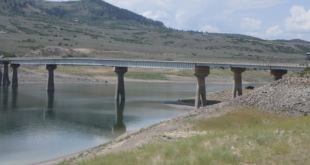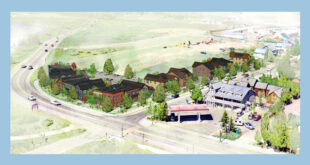Some question timing as company announces near bankruptcy
By Adam Broderick
At the same time that some of the country’s largest coal companies are filing for bankruptcy, the Forest Service is again proposing that protected Roadless Areas in the North Fork Valley be opened for mining exploration. That has some environmental groups skeptical of the proposal’s timing.
Arch Coal, the second largest coal company in the country, is currently $5 billion in debt and operates West Elk Mine near the towns of Somerset and Paonia. There are indications the company is on the verge of filing for bankruptcy protection. In its most recent quarterly report, the company wrote that many coal companies, including Arch, have been consistently reporting negative cash flow and, due to current market conditions, expect to continue to report losses for the foreseeable future.
Should Arch Coal go bankrupt and operations at the Somerset mine discontinue, Gunnison County would no longer collect taxes or royalties from the mine. According to the Gunnison County Treasurer’s Office, that would be a multi-million dollar hit for the county.
The U.S. Forest Service (USFS) released a statement last week addressing the impacts of coal mining and the amount of potential damage coal mining could do in the North Fork Valley – $12 billion, including negative impacts to the environment (up to 43.2 million metric tons of annual greenhouse gases), agricultural business, and human health, among other impacts.
In addition to addressing the potential damage, the USFS proposed reinstating a loophole in the Colorado Roadless Rule that would allow Arch Coal to begin scraping roads for coal and uncovering well pads for methane gas on approximately 19,700 acres of public land in and around the Sunset Roadless Area of the Gunnison National Forest.
The Colorado Roadless Rule, which was established in 2012 to conserve and manage roadless lands on more than four million acres of National Forest lands in Colorado, included the loophole for coal mining in the North Fork Valley. In 2013, conservation groups sued the USFS for what they called illegal actions on behalf of the agency, arguing that the agency neglected to address the potential economic impacts related to climate change due to carbon releases associated with burning the coal.
In 2014, a federal judge ruled in favor of the conservation groups and the loophole was vacated. This year, the USFS addressed those potential impacts in a draft supplemental environmental impact statement (DSEIS).
According to the DSEIS, which addresses potential economic and environmental impacts and explains Arch Coal’s objectives in the Roadless Areas, “Changes in gross production and consumption of coal from the North Fork Coal Mining Area are expected to have an effect on production and consumption of other fuel sources, including alternative supplies of coal, natural gas, and other energy supplies such as renewables…Total carbon dioxide emissions is estimated to increase by 131 million tons…”
High Country News wrote on November 21 that in the past, the government and industry have argued that if this coal isn’t mined, coal from another mine will just replace it and the climate change impacts will be equivalent. “The agency’s analysis estimates that in fact that’s not the case: 131 million metric tons more climate change pollution could be released than if the mining didn’t happen and other fuels for electricity were used,” HCN wrote.
Alli Melton, Public Lands Director for High Country Conservation Advocates (HCCA), told the Crested Butte News that although she’s not certain Arch’s financial position was at play, it seems suspicious the USFS proposal came in shortly after news broke about Arch Coal’s financial position.
Lawrence Lujan, acting media officer for the Forest Service, told the News that he has also heard about the “bailout” suspicion. But he maintains that the proposal to reinstate the North Fork coal mining exception is not to benefit any specific mining company. “It is to address a state-specific concern of not foreclosing coal mining operations within roadless areas in the North Fork Valley and in doing so we recognize the contribution that coal mining has to providing stability to local economies,” Lujan said.
Melton says this is the first time the USFS is really engaging in this type of environmental and economic analysis. “[Gunnison County] wrote in a scoping letter [to the Forest Service] that if the exemption to the Colorado Roadless Rule were to take effect then there needed to be proper accountability, so at least if the Forest Service is looking to reinstate [this exemption to the Roadless Rule] they need to first admit the full cost,” she said.
Gunnison County Manager Matthew Birnie confirmed that the county receives royalty money from mine operations. He said in an email that the county gets both property taxes and direct distribution of energy related taxes and royalties (severance and Federal Mineral Lease), so the continuation of that mine would result in a continuation of those revenues. Debbie Dunbar, Gunnison County Treasurer, reports Arch Coal paid the county more than $2.7 million in property taxes in 2014.
Kathy Welt of Arch Coal told the News on Wednesday, November 25, that even if the company did file for bankruptcy, business should continue at West Elk Mine. “That is our most profitable mine. We wouldn’t cease operations at sites that still work for us,” she said. “As long as we have places to sell the coal, we’re confident that operations [at West Elk Mine] will continue.”
Melton says one thing HCCA has pushed Gunnison County to do is to be leaders on the topic. “When you look at Arch Coal, the West Elk Mine is one of their only arguably profitable mines. Having the Forest Service bending over to reopen these areas is seen as an asset to [the county]. What is the full cost of this? In the long term, the monetary value does not move communities toward a more stable place. Right now we have the luxury to have our county and state leaders figure out how we can transition away from this extractive boom-bust cycle. That would create a net benefit for our climate as well as our communities,” she said over the phone Monday.
According to the USFS, coal from the West Elk Mine meets the definition of compliant and super-compliant coal reserves in accordance with the Clean Air Act. The coal has a high energy value, low sulphur, ash and mercury content, and is desirable for use in the generation of electricity.
The recent shift from coal to natural gas and renewable energy sources is affecting jobs worldwide, and companies in the western U.S. are getting hit hard. Coal now produces 37 percent of electricity in the United States, down from almost 50 percent in 2009. Federal data shows that since 2010 the number of jobs in the coal industry has dropped roughly 20 percent to fewer than 70,000, and that figure is only expected to decrease.
In October 2014 the Bowie No. 2 mine near Paonia laid off 150 employees due to lack of demand for coal, and this past October laid off nearly 100 more employees.
“These are undoubtedly difficult, if not unprecedented, times for the coal sector,” says Glen Kellow, CEO of Peabody Energy, the world’s largest coal company.
The Forest Service will accept comments on both the proposed rule and the DSEIS until January 4, 2016. A decision on the matter is expected by summer of 2016. This past spring, more than 100,000 of the submitted public comments opposed the proposed loophole that would allow bulldozing for coal and methane extraction.
Submit comments electronically at go.usa.gov/3JQwJ, or send written comments to: Colorado Roadless Rule, 740 Simms Street, Golden, CO 80401.
An open house for information sharing is scheduled for December 7, from 5:30 to 7 p.m. at Paonia Town Hall, 214 Grand Avenue, Paonia, CO 81428. Another open house is scheduled for December 9 at the USFS regional office in Golden. The DSEIS is available for review at www.fs.usda.gov/goto/coroadlessrule.
 The Crested Butte News Serving the Gunnison Valley since 1999
The Crested Butte News Serving the Gunnison Valley since 1999




